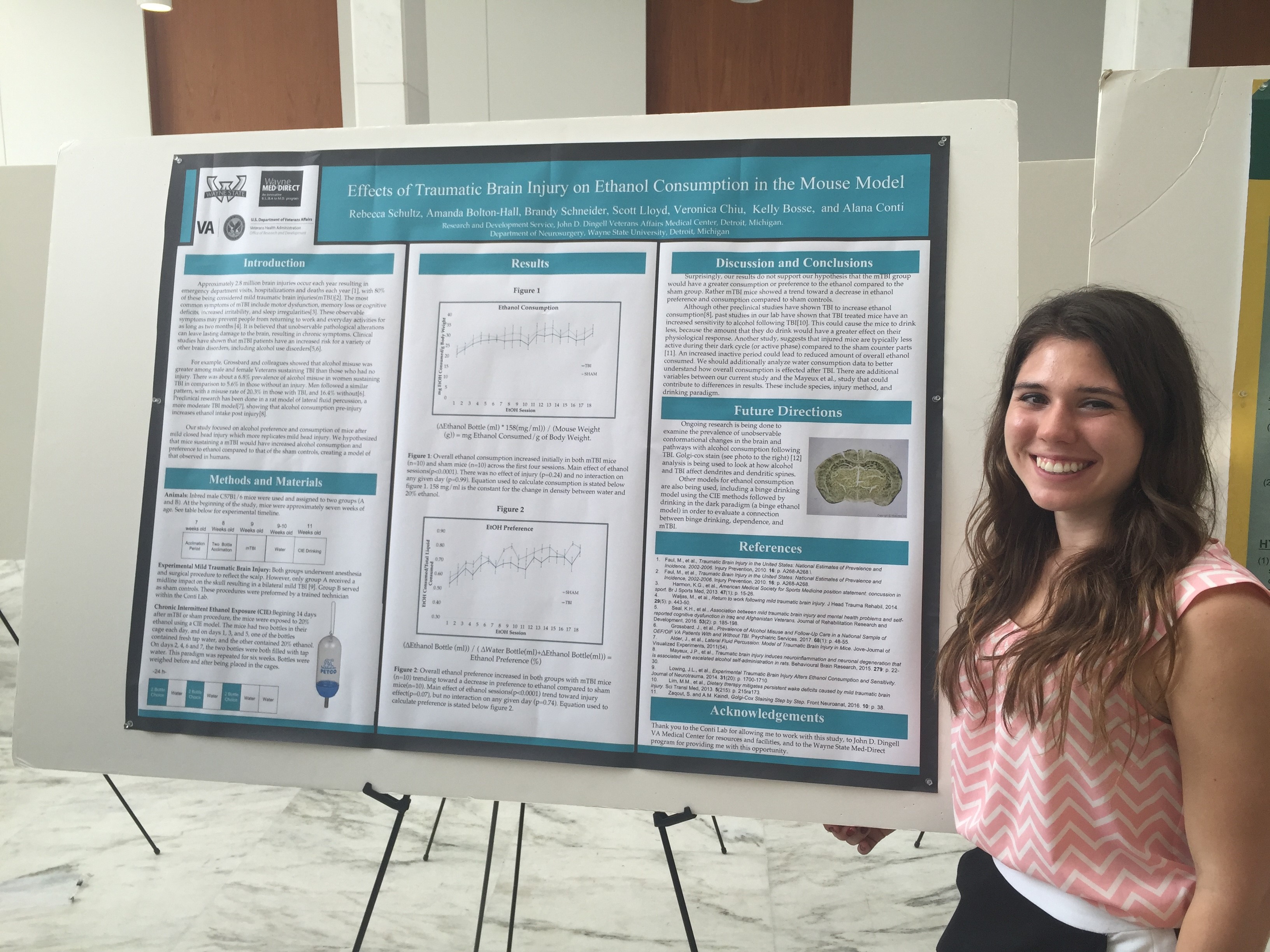Med-Direct students receive Undergraduate Research Opportunity awards to conduct Research
Rebecca Schultz and Leah Warren are two Wayne Med-Direct students who are invested in Biomedical and History research respectively. They were recently awarded with the Wayne State Undergraduate Research Opportunity (UROP) awards to support their research. Med-Direct program interviewed them about their research experience, their time in the Med-Direct program, and asked about their future plans.
Rebecca Schultz
How did you become interested in science and medicine?
I'm from Marine City, Michigan and I attended Cardinal Mooney Catholic High School. Growing up, I had always been interested in science but I wasn't certain if I wanted to pursue a career in the sciences. However, once I was in high school I began to gain more exposure to the medical field and have aspired to become a physician ever since.
What are your aspirations in becoming a physician?
At Wayne State, I have had the opportunity to gain exposure to a variety of different research, shadowing, and volunteering experiences that benefits me to become a well rounded physician. I'm not entirely sure what kind of doctor I want to be. However, I'm very interested in nutrition, exercise, and other measures that can be taken in order to reduce the preventable health issues. I look forward to becoming a physician and working with socioeconomically disadvantaged communities on preventative care through nutrition and health screening.
Tell us about your research project.
Approximately 2.8 million traumatic brain injuries (TBIs) are documented each year between emergency department visits, hospitalizations and even deaths. These TBIs contribute to approximately $17 billion spent nationwide on diagnosis and treatment. My research project, studies the chronic effects of traumatic brain injury on the structure of neurons in the brain. I hypothesized that TBI-induced changes in neuron structure underlie the observed deficits in learning and memory that commonly follow TBI. I am evaluating several features of neuronal morphology including dendritic length and branching in the mouse brain following mild TBI. Furthermore, I am looking to optimize a technique for the automatic assessment of neuron morphology.
How beneficial was the UROP award for your research experience?
I applied for and received a grant from the Wayne State University Undergraduate Research Opportunities Program to fund my study. I am beyond grateful for the opportunity to pursue my research project. I also won the Wayne State Academy of Scholars Poster Award at the Wayne State Undergraduate Research Symposium this March, for the best poster presentation. I was over the moon to receive this award and it was a great experience presenting my work to others.
 What lessons did research teach you?
What lessons did research teach you?
Through my experience in Dr. Alana Conti's lab in the Wayne State Medical School, I have gained a thorough understanding of how to think like a researcher. Studies don't always turn out as we may expect. Learning to ask and find answers to the questions "what if" and "why" is a skill that has helped me to become a better student and will continue to play an important role in my career as a physician.
Leah Warren
Tell us about your research project.
Throughout my sophomore year, I researched the impact of the Great Potato Famine on Irish public health. I have always been fascinated about the intersection of history and medicine, particularly relating to the spread of epidemic diseases. While many would assume that starvation is the main cause of mortality during the Great Famine, in this case, far more people died due to infectious and digestive diseases. In addition, before the germ theory of disease was introduced in the 1860s, doctors practiced treatments that were often very harmful to the patient and often carried infections as much as they treated them. Through this project, I also learned that physicians were excluded from participating on famine relief commissions. By lacking an outlet to have their voices heard, physicians were unable to help dictate where funding was allocated.
How beneficial was the UROP award for your research experience?
Thanks to the generous support of the University Research Opportunities Program and the Sterne-Lion scholarship, I traveled to Dublin and London for 18 days to collect sources for my project. Although many historians have written about the significance of this famine, few have investigated the relationship between physicians, epidemic diseases, and the famine. Thus, in order to study this subject matter, I had to visit the places where the primary archival sources were available such as the British Library, National Archives of Ireland, National Archives in Kew, National Library of Ireland, and the Royal College of Physicians in Ireland. Through this research project, I have learned so much about not only the Great Potato Famine, but about the importance of physicians in times of crisis.